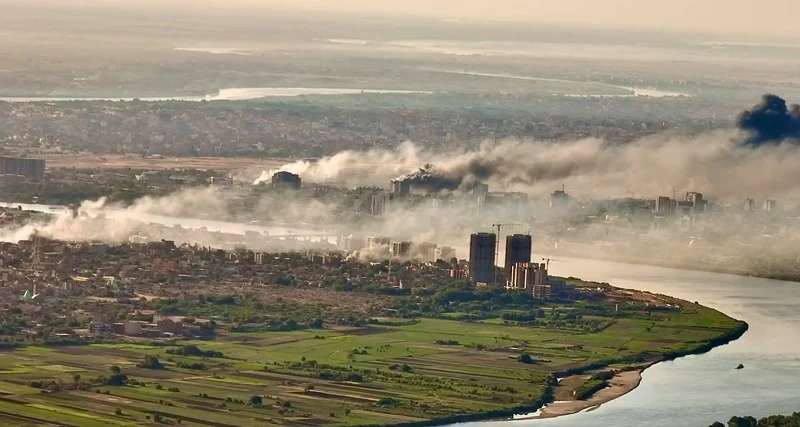External Affairs Minister S Jaishankar dialled his counterparts in the United Arab Emirates (UAE) and Saudi Arabia, exchanging views on the situation in Sudan, with the intent of ensuring the safety of Indian nationals caught in the African nation’s internal conflict.
EAM’s discussions with the UAE Foreign Minister Sheikh Abdullah bin Zayed Al Nahyan and Saudi Foreign Minister Prince Faisal bin Farhan Al Saud follow as hostilities continue to increase in Sudan.
On April 16, a day after armed clashes took place in Khartoum between units of the Sudanese army and the Rapid Reaction Forces, the Indian Embassy reported that Albert Augestine, an Indian national working in a Dal Group company in Sudan, got hit by a stray bullet and has succumbed to his injuries
India on Tuesday “sincerely requested” all its citizens in the Northeast African country to stay put where they are and not venture outside.
“We have come across many instances of looting. All Indian nationals are advised please not to venture out. Please ration your supplies. The situation may continue for a few more days. Please try to take help from your neighbours. Please stay at home and remain safe,” tweeted the Embassy of India in Khartoum.
Large plumes of smoke are bellowing over Khartoum this morning, namely from the airport area. One specific fire seems to be in the fuel area within the airport. pic.twitter.com/4ceyeZ91qp
— Benjamin Strick (@BenDoBrown) April 19, 2023
The dramatic events taking place in Sudan are causing serious concern in New Delhi where a control room has been set up at the Ministry of External Affairs (MEA) to provide information and assistance.
“Spoke to Foreign Minister of Saudi Arabia, HH @FaisalbinFarhan just now. Appreciated his assessment of the Sudan situation. Will remain in close touch,” tweeted Jaishankar after the phone conversation with Saudi Foreign Minister Prince Faisal bin Farhan Al Saud late Tuesday.
“Thank HH @ABZayed, Foreign Minister of UAE, for the exchange of views on the situation in Sudan. Our continuing contacts are helpful,” the EAM said on his call with the UAE Foreign Minister Sheikh Abdullah bin Zayed Al Nahyan.
2
الخرطوم هذا الصباح
الأربعاء 19 أبريل 2023 م
28 رمضان 1444
اليوم الخامس من الاشتباكات بين الجيش السوداني ومليشيا الدعم السريع
عبدالمهيمن
..
| #sudan_update | #KeepEyesOnSudan | #أحداث_السودان | #أوقفوا_الحرب pic.twitter.com/hTuw1nXOqT— طــــه ود حنـــان (@6a7a_hussein) April 19, 2023
Overnight, the US Secretary of State Antony Blinken also spoke with Saudi Foreign Minister to emphasise “common regional and global priorities, including shared efforts to bring an immediate end to the fighting in Sudan”.
Blinken has spoken separately with General Abdel Fattah al Burhan, Commander of the Sudanese Armed Forces, and General Mohamed Hamdan Dagalo, Commander of the Rapid Support Forces, to express grave concern about the death and injury of so many Sudanese civilians due to the sustained and indiscriminate fighting.
“They are fighting over seats of power, while we are fighting to be able to eat and drink. They’re fighting to steal and exploit, while we are fighting to eat, have education and healthcare”
– Sudanese citizen about the situation#Sudan
pic.twitter.com/mnLEnArl82— Karim Wafa Al-Hussaini (@DrKarimWafa) April 18, 2023
UK’s Guardian reports that major geopolitical dimensions are also at play, with Russia, the US, Saudi Arabia, the United Arab Emirates and other powers battling for influence in Sudan.
“The Saudis and the UAE have seen Sudan’s transition as an opportunity to push back against Islamist influence in the region. They, along with the US and Britain, form the ‘Quad’, which has sponsored mediation in Sudan along with the UN and the African Union. Western powers fear the potential for a Russian base on the Red Sea, which Sudanese military leaders have expressed openness to,” says the British newspaper.
Meanwhile, the Indian Embassy in Khartoum advised the Indian citizens to stay away from open spaces like balconies or terraces and keep essentials like medicine, water, money, passport, OCI card food ready with them to ensure easy mobility, when feasible, indicating a possible evacuation opearation as soon as things are some control.
Military operations using heavy equipment are taking place in the area of the Republican Palace, the main command of the Armed Forces of the Republic of Sudan, the airport, the central market, as well as near military bases in the south of the Sudanese capital.
The international airport is temporarily closed, and bridges over the Nile River are blocked. An escalation in tension is also reported in the city of Meroe, 500 km north of Khartoum.
The dramatic events have massively pushed back efforts to restore Sudan’s democratic transition.
What are the four horns of Africa?
The North-Eastern region of the African continent including the countries of Sudan, Eritrea, Ethiopia, Djibouti and Somalia is known as the Horn of Africa since the group of countries form a horn-like landmass over the peninsula. pic.twitter.com/kJdPHpPdni— MYRNA Roces Ortiz (@Tarr362185Tarr) April 19, 2023
Sudan has been in a major political crisis since 2019 when Omar al-Bashir, a despot who ruled the country for three decades, was toppled by Sudanese military officers led by Burhan.
In July 2019, following continued protests, it was agreed to form a transitional government in partnership with a civilian pro-democracy coalition.
On October 25, 2021, Lieutenant General Burhan, with the support of General Mohamed Hamdan Dagalo, also known as ‘Hemedti’, seized control of the government in a coup, deployed the military to the streets of Khartoum and Omdurman, and arrested and detained Prime Minister Hamdok and other civilian officials.
Now, as Sudan was getting ready for elections in July and the country’s de facto ruler Burhan and his military would have returned to the barracks giving way to a civilian government, Burhan and his former deputy Dagalo have turned against each other to seize power in the resource-rich nation.
Also Read: India advises nationals to stay watchful, be ready for quick evacuation amid armed clashes in Sudan



















